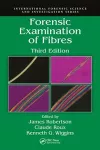
Forensic Examination of Fibres
3 authors - Hardback
£145.00
James Robertson of the National Centre for Forensic Studies (NCFS) at the University of Canberra graduated with a BSc (Hons) in 1972 and PhD in 1976 from the University of Glasgow. He lectured in forensic science at the University of Strathclyde from 1976 to 1985 before moving to Australia. After five years at the State Forensic Science Centre in Adelaide he completed twenty years as the head of the forensic group with the Australian Federal Police (AFP) in the process developing a world class and respected forensic group from modest beginnings. He returned to an academic role as a Professorial Fellow on his retirement from the AFP in 2010. He is currently also the Director of the NCFS.
He is also an Honorary or Adjunct Professor at several Australian and overseas universities. He has published well over 100 scientific papers and book chapters, edited or coedited four textbooks, is the Editor of the Australian Journal of Forensic Sciences and is a member of the editorial board of several journals.
He has held senior positions on all forensic advisory groups and organisations in Australia including being the current President of the Australian Academy of Forensic Sciences (AAFS), Vice-President of the Australian and New Zealand Forensic Science Society (ANZFSS), Chair of the Advisory Forum to the National Institute of Forensic Sciences (NIFS), Chair of Standards Australia (SA) Forensic Committee and a past Chair of the Senior Managers Australian and New Zealand Forensic Laboratories (SMANZFL).
His contribution to the forensic sciences and education has been recognised with the awards of a Doctor of the University by the University of Canberra, the Australian Public Service Medal (PSM) and a Member of the Order of Australia (AM).
James continues his active interest in, and passion for, the forensic aspects of trace evidence, especially fibres and hairs.
Claude Roux completed his undergraduate and PhD studies in forensic science at the University of Lausanne, Switzerland, then migrated to Australia in 1996 where he was appointed as a lecturer at the University of Technology Sydney (UTS). His PhD thesis focused on fibre evidence interpretation. Since then, Claude has been pivotal to the development of forensic science in his adopted country over the past 21 years by developing and leading the first undergraduate degree and PhD program in forensic science in Australia. In 2002, he became the founding Director of the UTS Centre for Forensic Science, being Professor of Forensic Science since 2004. His professional motivation has been largely driven by his vision of forensic science as a distinctive academic and holistic researchbased discipline.
Throughout his career, Claude has published more than 160 refereed papers and 25 book chapters and a large number of conference presentations. Although his research activities cover a broad spectrum of forensic science across social and experimental sciences, he remains active in the area of fibres, being a member of the European Fibres Group (now ENFSI Textile and Hair Group) since its inception in 1993. Claude is a member of the editorial board of six scientific journals and of a number of working and advisory groups. He is the immediate past President of the Australian & New Zealand Forensic Science Society (ANZFSS), the current Vice-President of the Australian Academy of Forensic Sciences and a Fellow of the Royal Society of New South Wales. Between 2014 and 2016, he also served on the Scientific Advisory Board of the International Criminal Court, The Hague, The Netherlands.
Kenneth G Wiggins joined the then Metropolitan Police Forensic Science Laboratory (MPFSL) in 1970. Moving from the biochemistry section Ken specialised in the forensic examination of fibres. With the merger of the MPFSL into the Forensic Science Service (FSS) in 1996, he moved to the Analytical services group before a move to the Research and Development Division as an advisor and consultant dealing with fibres. Ken published a number of key papers especially in the areas of fibre dye analysis and he was the author of the chapter on ropes and cordage in the second edition of the Forensic Examination of Fibres which has been retained in this third edition. Ken formed a close professional relationship with Mike Grieve that saw them work on a number of major strategic projects such as the establishment of the European Fibres Group (EFG) with Mike and Ken taking on the executive roles in this group and developing it into one of the most successful ENSFI (European Network of Forensic Institutes ) working groups. Ken was to be a co-editor of this third edition but sadly Ken passed away in 2009 from motor neurone disease. As with the contributions to the second edition from Mike Grieve, the contributions from Ken have also been retained, and updated where appropriate, to recognise the substantial contribution made to the forensic examination of fibres by Ken Wiggins over a forty year time span in forensic science.